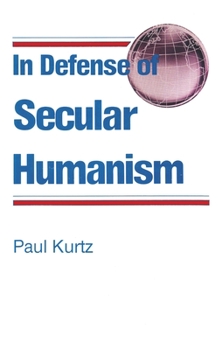In Defense of Secular Humanism
Select Format
Select Condition 
Book Overview
Are the fundamentalists shaking the foundations of the American republic?- When they condemn humanism's influence in the schools, are they not actuallyattacking modern education, science, culture, and philosophy?- Is it possible to be moral without benefit of clergy or creed?- Can humanism help open doors so that individuals, singly and in cooperationwith others, can create lives that are rich in enjoyment, eloquent andmeaningful?What is humanism,...
Format:Paperback
Language:English
ISBN:0879752289
ISBN13:9780879752286
Release Date:October 1983
Publisher:Prometheus Books
Length:273 Pages
Weight:1.15 lbs.
Dimensions:0.8" x 6.0" x 9.1"
Customer Reviews
3 ratings
Good intro to humanism
Published by Thriftbooks.com User , 15 years ago
"In Defense of Secular Humanism" by Paul Kurtz. Great introduction to this topic from one of its earliest and most staunch proponents. Because I'm a slow learner, the essay's consistent theme kept reinforcing Kurtz's defense.
Fair (Early) Introduction To Humanism
Published by Thriftbooks.com User , 16 years ago
A compendium of essays, some better than others, Kurtz reports secular humanism (SH) is based on rational thinking, opposed to dogma and any system or influence suppressing critical thinking (Church, State, bigotry Left or Right). It is not a religion as it "generally" dismisses the supernatural as readily as the paranormal, astrology, UFOs and all superstitions. (One can see why it will never have a significant following, as superstition is much easier and goes far in making boring / suffering lives more exciting / tolerable.) High on the SH list is moral education, noting non God-based morality needn't be antisocial, subjective or promiscuous (as is, apparently frequently, one of the attacks on SH). Kurtz supports a program of moral education rather than obedience to a canon. Ethics has a longer history than Judeo-Christianity, he argues. (We assume he's not predating Greek ethics before Hebrew Law - perhaps Hammurabi?) "It is in the crucible of history that ethics have been tested." (i.e. no need for commandments.) Kurtz submits that God does not speak to humanity from above, but the Word is instead an expression of humanity's deepest longings (i.e. it is man speaking to himself). Yet, he stresses that simply rejecting theism is not humanistic, respect for religious freedom must be maintained. Likewise his Secular Humanist Declaration reads like a review of the US Constitution and Bill Of Rights. He also notes reasonable limits to science, misapplied to nature and human life, opening opportunities for ecological disaster and dehumanization of people and their institutions. The ultimate goal should be human growth for all, not a few, and humans are to be responsible for it, rather than forever waiting on divine intervention. "The problem for man is to discover the good life, which is achievable in human terms. The standard is... within man where sources of the good life are to be found, and in this view is an affirmation that life is worth living." Natural Humanists (a slight twist on secular) support Jesus' remark that "the kingdom of God is within thee." Humanism claims humanity as rooted in the soil (nature), it is the flesh (life) that provides satisfaction, but it is social harmony and creative fulfillment (the spirit) that we find our deepest significance. Kurtz shines most in his chapter on Libertarianism. Oddly, earlier in the book he supports world order through world laws of transnational governments. (Yikes.) Extreme disproportions of wealth should be reduced worldwide, he says. Generally agreeable, but since this is an overview, we never know how exactly he intends to make this happen without the usual resulting tyranny. In Libertarianism he goes on to say that large governments are a threat as is new Liberalism's paternalistic welfare state. The principle of equality in the extreme has turned "equality before the law", and "equality of opportunity" into guarantees of equal results. "Doctrines of social equality are counterproduct
Rightwingers on the Warpath
Published by Thriftbooks.com User , 23 years ago
Paul Kurtz, professor of philosophy, publisher of Prometheus Books, and editor of Free Inquiry, wrote this volume in the early 1980s, when the Moral Majority were on a war path against the "religion" of Secular Humanism. Though many of his articles are redundant, Kurtz's book being a compilation, his rebuttal of much of the Religious Right's paranoia is as refreshing today as it was then. If the Secular Humanists were such a power block, it would stand to reason that such organizations would have far more than a few thousand members each. What the Falwells of the world are reacting to, lumped together under the S.H. bogeyman, is the influence of a broader humanism, which is attractive to many religionists who see little contradiction with their beliefs. The clock can't be turned back.





